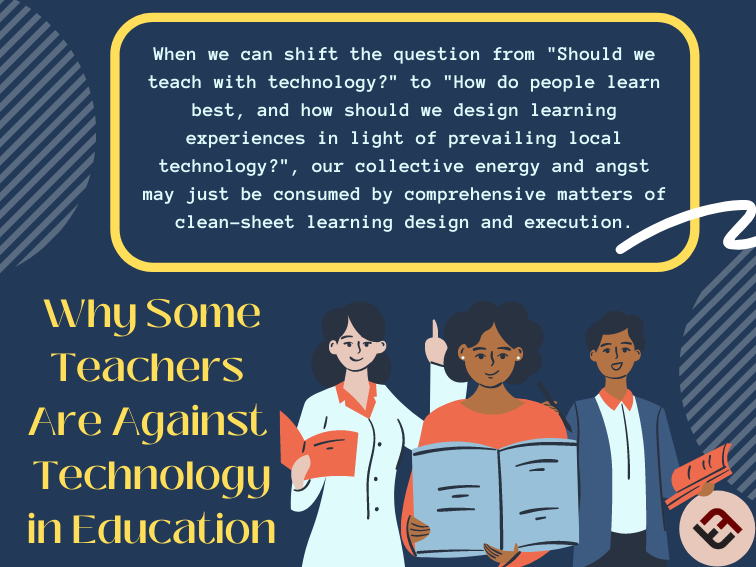
Why Are Some Teachers Are Against Technology In Education?
by Terry Heick
Some educators are upset.
Recently I’ve noticed an increasing number of ed folks enthusiastically question education technology—and do so with enough sarcasm and bitterness and choice language to embarrass their mothers. If you’re not making some people angry, you’re probably not trying hard enough, but being “for” or “against” technology is a crude sentiment.
I’ve been trying to understand it–and note, this isn’t even about whether or not #edtech is good or bad. This is more about all that hostility. It makes sense to be skeptical of change, especially in an industry with such a mixed history of evolving itself. Every few years someone in education has a bright idea that, for whatever reason, doesn’t light things up the way it might’ve.
This has a few net negative effects, among them a kind of permanent momentum where change comes and change goes. We get used to failure.
Failure is the change.
Some observant educators have noticed this trend, and so preach patience and fidelity when integrating critically necessary new thinking—even when, like scripted curriculum or test-based accountability, that thinking is flawed. This gives us an interesting ecosystem of both pursuing and resisting new ideas.
The Problem With The #edtech Conversation
At first the #edtech skepticism seemed to be formed around the utility and effectiveness of these new learning tools, the same way we might question a new assessment form or academic standards. It seemed to be more singular—this learning tool or that learning tool. Now “technology” seems all lumped together, the iPads with YouTube with social media with mobile learning.
This is a big part of the problem.
Further complicating matters is the difficulty of effectively integrating technology in the classroom. This is hard for some educators (who do it well) to appreciate. You have to understand content, teaching, and technology on nearly equal terms, and when you don’t it all has an awkward way of illuminating the holes in a teacher’s expertise. That doesn’t mean that teachers that question edtech do so simply because they’re not good at it, but rarely do you hear people complain about things they do well.
In truth, however, this is much more than merely bellyaching. There are a lot of very bright educators–who see the same apps and go to the same trainings and read the same blogs and books that you do– that have a real problem with technology in schools.
Where some see a revelation, others see expense, distraction, and a lot of rhetoric.
Technology Is Designed To Stir Emotions. So Here We Are, Stirred.
Education technology is costly. It takes practice and a lot of trial-and-error, and just when you start to find your rhythm, it all changes again. It also naturally disrupts most schools and systems in general, at which point it becomes, whether teachers can see it or not, about pride. An identity thing.
Though new academic standards make technology in learning a matter of both policy and law, policy and law doesn’t inspire anyone. Technology is in your face, flashy, and awkwardly personal—it seeks out our imagination in everything from user interfaces to app design and social integration. A smartphone or a tablet isn’t technology so much as it is a portal to a new way of thinking. Apple designed the iPad so you’d feel an emotional response to it. It is this deep stirring of people that is partially to blame for the anger as well.
Compelling mobile technology is inherently manipulative to both people and the systems those people make up. That means the current system of education is, at best, aging and rickety. And some teachers are ready to burn it all down, and have been for years; for them, technology is transformational.
Others–I think–believe in the simple interaction between learner and content that technology can obscure. For them–maybe–technology is making a lot of noise in a room where they’re trying to get important work done, like a rock band in a library.
And this is where things get stressful. Technology doesn’t make teaching better or worse, simpler or more complex–it changes it all entirely. The frameworks. The models. The training. The instructional design. Curriculum. Lesson design. Assessment. Learning feedback. Classroom management. School design. All of it.
And in a way I’m not even sure edtech proponents are ready for, much less the teachers that have been worried all along.
Honoring The Complexity Of Teaching & Learning
Every educator needs to fully understand what they’re “for” and “against.” If we can summarize our thinking by being “pro” this or “anti” that, we’ve likely under-thought things.
The scuffle around #edtech has distracted us from other far more crucial conversations, including the new learning models like blended learning, self-directed learning, flipped classrooms, mobile learning, and sync teaching that technology enables.
The way forward, then, might just be a more nuanced discussion about how people learn, and what role technology can play in that process. When we can shift the question from “Should we teach with technology?” to “How do people learn best, and how should we design learning experiences in light of prevailing local technology?”, our collective energy and angst may just be consumed by comprehensive matters of clean-sheet learning design and execution.
And fewer of us will have time to be upset.
